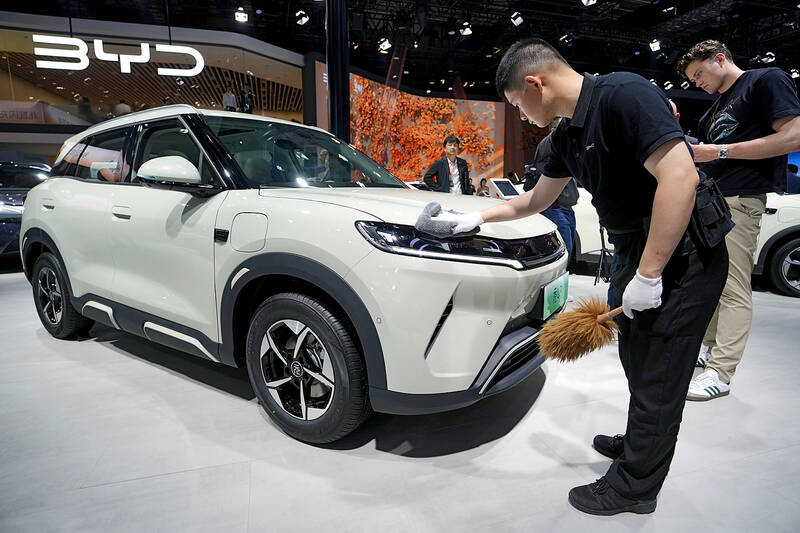Chinese electric vehicle (EV) maker BYD Co (比亞迪) has slashed its full-year sales target as intense competition in its home market hurts its bottomline.
The world’s biggest seller of EVs now plans to deliver 4.6 million units this year, down 16 percent from its previous expectation for 5.5 million, Reuters reported yesterday, citing people it didn’t identify. BYD didn’t comment on the report.
The company may sell 4.5 million units this year, according to estimates compiled by Bloomberg.

Photo: Ng Han Guan, AP
The revision shows that not even dominant players are safe in China’s cutthroat market. Shenzhen-based BYD reported a shock 30 percent drop in quarterly profit last week, its first decline in over three years, while deliveries for July and last month are largely flat from the same time last year as attractively priced mass-market models from domestic rivals win over consumers.
The carmaker has also been buffeted by Beijing’s crackdown on the aggressive discounting that has helped it eke out market share in recent years.
BYD is now entering the peak sales season this month and next month without merely relying on discounts and trying to fend off rivals that are offering sleek, technology-focused models at similar price points.
The carmaker is still by far China’s most popular EV brand. But affordable, technology-focused models launched by the likes of Geely Automobile Holdings Ltd (吉利控股) and Xpeng Inc (小鵬) are chipping away at its dominance. Meanwhile, new entrant Xiaomi Corp’s (小米) electric SU7 sedan and YU7 sport utility vehicle have proven unexpectedly popular.
Still, BYD seems to be increasingly turning its attention outside of China, noting that higher profitability there has made its overseas business a key driver for continued growth. The brand has made major inroads in markets like Brazil, Australia, Singapore and parts of Europe. Overseas revenue, excluding Hong Kong, Macau and Taiwan, was up 50 percent in the first six months versus the same period a year ago.

PERSISTENT RUMORS: Nvidia’s CEO said the firm is not in talks to sell AI chips to China, but he would welcome a change in US policy barring the activity Nvidia Corp CEO Jensen Huang (黃仁勳) said his company is not in discussions to sell its Blackwell artificial intelligence (AI) chips to Chinese firms, waving off speculation it is trying to engineer a return to the world’s largest semiconductor market. Huang, who arrived in Taiwan yesterday ahead of meetings with longtime partner Taiwan Semiconductor Manufacturing Co (TSMC, 台積電), took the opportunity to clarify recent comments about the US-China AI race. The Nvidia head caused a stir in an interview this week with the Financial Times, in which he was quoted as saying “China will win” the AI race. Huang yesterday said

Nissan Motor Co has agreed to sell its global headquarters in Yokohama for ¥97 billion (US$630 million) to a group sponsored by Taiwanese autoparts maker Minth Group (敏實集團), as the struggling automaker seeks to shore up its financial position. The acquisition is led by a special purchase company managed by KJR Management Ltd, a Japanese real-estate unit of private equity giant KKR & Co, people familiar with the matter said. KJR said it would act as asset manager together with Mizuho Real Estate Management Co. Nissan is undergoing a broad cost-cutting campaign by eliminating jobs and shuttering plants as it grapples

The Chinese government has issued guidance requiring new data center projects that have received any state funds to only use domestically made artificial intelligence (AI) chips, two sources familiar with the matter told Reuters. In recent weeks, Chinese regulatory authorities have ordered such data centers that are less than 30 percent complete to remove all installed foreign chips, or cancel plans to purchase them, while projects in a more advanced stage would be decided on a case-by-case basis, the sources said. The move could represent one of China’s most aggressive steps yet to eliminate foreign technology from its critical infrastructure amid a

MORE WEIGHT: The national weighting was raised in one index while holding steady in two others, while several companies rose or fell in prominence MSCI Inc, a global index provider, has raised Taiwan’s weighting in one of its major indices and left the country’s weighting unchanged in two other indices after a regular index review. In a statement released on Thursday, MSCI said it has upgraded Taiwan’s weighting in the MSCI All-Country World Index by 0.02 percentage points to 2.25 percent, while maintaining the weighting in the MSCI Emerging Markets Index, the most closely watched by foreign institutional investors, at 20.46 percent. Additionally, the index provider has left Taiwan’s weighting in the MSCI All-Country Asia ex-Japan Index unchanged at 23.15 percent. The latest index adjustments are to